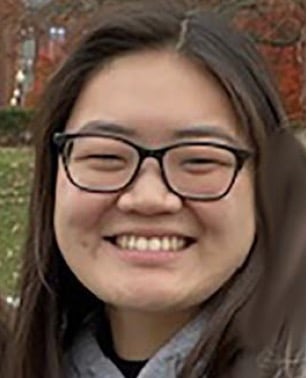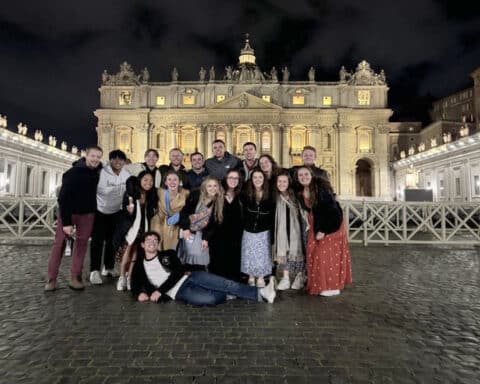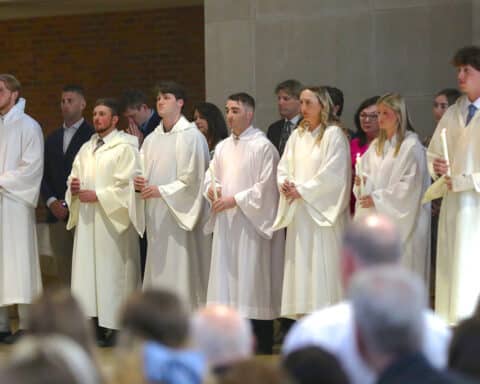“I’m not sure I always fully bought into it,” admits Ana Botelho, regarding the Catholic faith of her youth.
The 20-year-old Rhode Island native explains that, even though she grew up with a dad who was a deacon and within a family committed to weekly Mass attendance, as well as family prayer, she needed to fully commit to it herself.
Botelho suggests that a necessary component of coming to faith is the process of making it one’s own, rather than remaining something your parents had you do.
A junior at Providence College in Rhode Island, Botelho is completing a theology and philosophy double major with the hopes to teach at the college level.
|
“I think that if you see someone living out their faith and being joyful about it, that’s attractive. Joy is something, unfortunately, that seems to be in short supply.” — Ana Botelho |
Reflecting on her faith journey thus far, Botelho perceives that her situation is almost a “best-case scenario” with her parents having set her up with all the tools necessary to fall in love with her Catholic faith.”And then I did,” Botelho said.
“I had the foundation growing up, but not really the motivation maybe,” Botelho said. She experienced the latter when she encountered campus ministry in her freshman year.
Read more from our special college section here.
“Once I came here, I not only got the motivation, but also the love and the desire for faith and a relationship with God,” Botelho said of her time at Providence College.
She is now a student leader with campus ministry and assists with the RCIA program as a student catechist.
A critical time of decision-making
Like Botelho, Annika Albrecht grew up in a faithful Catholic home.
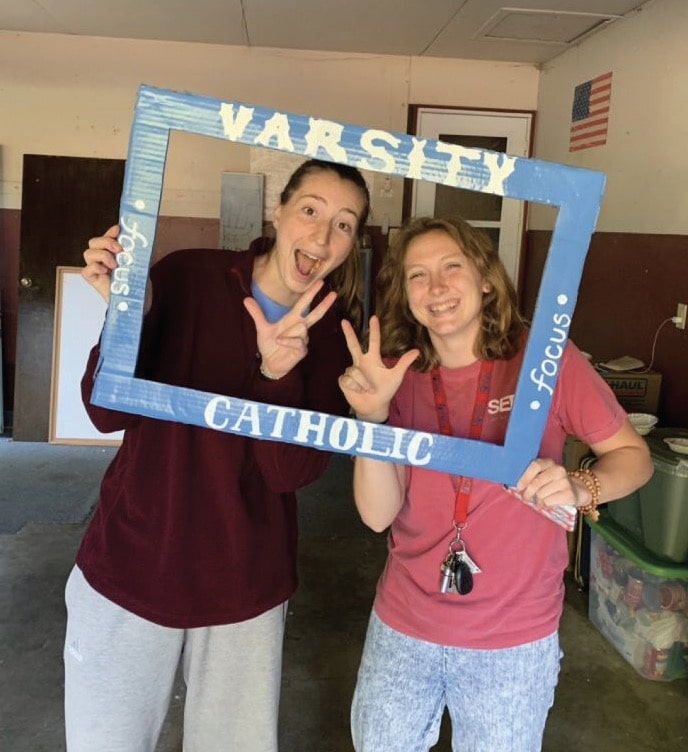
The youngest of seven children, Albrecht is now serving in her third year as a missionary with the Fellowship of Catholic University Students (FOCUS), a Catholic apostolate. She is currently ministering at Carroll College in Helena, Montana, as the team director for FOCUS on that campus.
“It’s such a dynamic time of our life,” Albrecht said. “I made so many decisions in college that set a trajectory for the rest of my life.”
Though Albrecht acknowledges that things can change over the course of one’s life, she believes it’s imperative to have an opportunity to encounter Jesus more intimately during these years when a young person is deciding about significant things like their major or even a future spouse.
“It’s so important for this encounter to happen at this time of radical change in your life,” she said.
Josiah Klas agrees.
Klas was introduced to Saint Paul’s Outreach (SPO) during his freshman year at the University of St. Thomas in Minnesota. He is now a missionary on that same campus where he serves as a chapter leader for SPO, a ministry with a charism of relational evangelization.
The decisions they make now are going to have a massive impact on who they’re going to become, Klas said of college students.
Klas said that even changing the trajectory of students’ lives by a couple of degrees is highly impactful.
And not only their lives.
He cited how transformed lives can, in turn, act as transforming leaven in the cities where SPO is present.
Talitha Lemoine of Catholic Christian Outreach (CCO), a Canadian university student movement founded in 1988, also perceives the far-reaching fruits of students reached with the Gospel during their post-secondary studies.
She said that these students are going to be leaders in the world, the future politicians, lawyers, doctors, teachers, mothers, fathers and priests. “They’re in our universities right now,” Lemoine said.
Without missionaries on campus, Lemoine wonders how young people are going to encounter Jesus. “That has eternal consequences,” she said of their presence.
Community support
Albrecht of FOCUS maintains that faith outreach is significant for those “who come from strong Catholic families,” such as herself, as well as “those who have never heard the name of Jesus.”
“When you’re sent to college, your family isn’t there to encourage you to go to Sunday Mass,” said the 25-year-old former professional volleyball player.
Accordingly, Albrecht said it’s important for ministries such as FOCUS to be present on campus to support Catholic youth to invest in “their own relationship with Jesus” and to invite others “into a life with Christ.”
Botelho can attest to this. “Without campus ministry, you kind of feel isolated,” she said.
“Campus ministry is a place that allows us, as a group, to try and pursue what life in Christ looks like — a life modeled after Christ,” she said.
Botelho noted how human beings are “meant to love and to be loved.”
“If that’s what God made us for, we need a community to show us what that looks like and to show us that we are loved and to show us that we can love,” Botelho said. “You can’t do that on your own.”
Klas, of Saint Paul’s Outreach, echoed Botelho’s sentiments about the importance of community, a central tenet of SPO’s identity. Whatever events or programs SPO coordinates, Klas said that there is a larger goal to have participants experience it as “being a part of a people.”
“What we’re trying to do is have a way of life as a people together,” he said.
He explained that a primary way to achieve this is through “households” wherein SPO missionaries live with students. “I and the student are brothers,” Klas said. “We’re running after the Lord together, running after this way of life together.”
Ways to reach people
Though each ministry and movement has its own defining characteristics and unique ways to reach post-secondary students, there are many approaches they share in common.
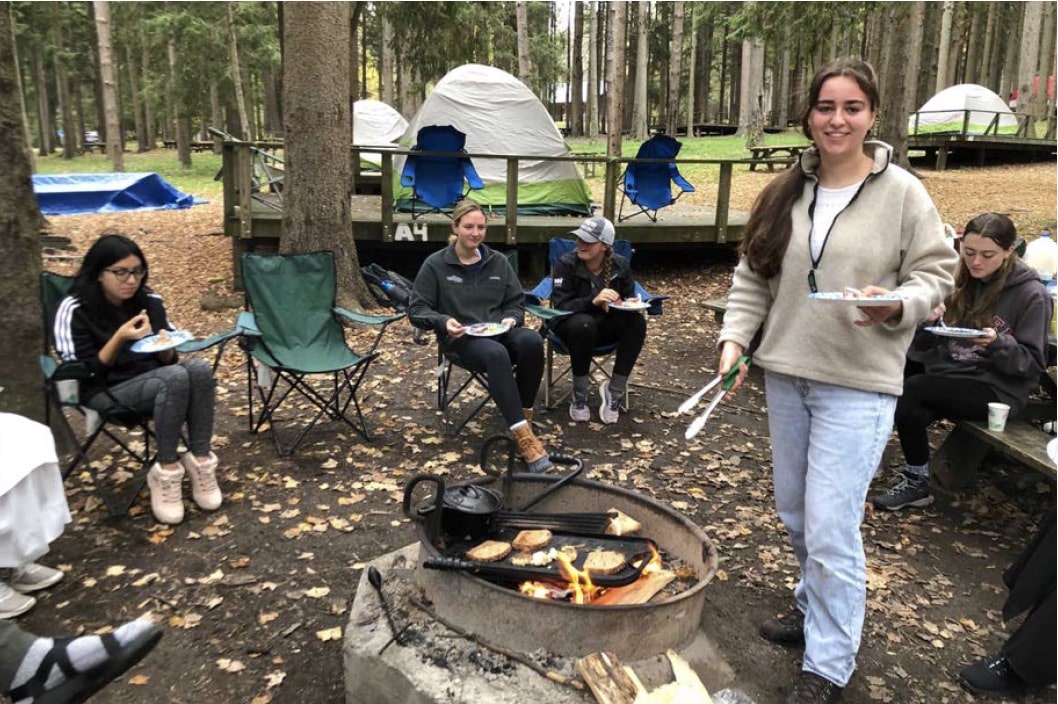
Those involved in campus ministry will often invite students to parties and events. They will sit with people they don’t know for meals or play sports with them, such as pickup basketball.
“Going where they are is a good start,” Klas said. “It’s just putting yourself in positions where you can meet more people and build relationships with them.”
Having a personal relationship with someone affects how open they are to hearing about what you think and what you care about, Klas said.
Botelho, of Providence College, sees ministry on campus as involving witness as well as pursuing and inviting students.
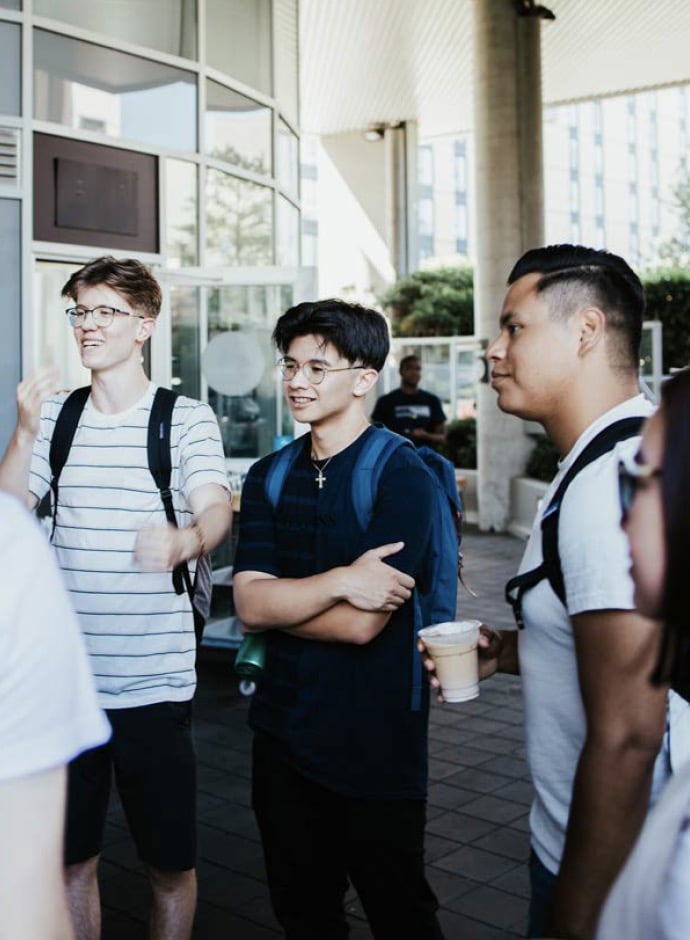
“I think that if you see someone living out their faith and being joyful about it, that’s attractive,” Botelho said. “Joy is something, unfortunately, that seems to be in short supply in some senses.”
Lemoine can testify to the role of joy.
She recounted the story of a young woman who was drawn to missionaries and students who were hanging out. “They were just being joyful,” Lemoine said. The student asked what the group was doing and, after learning that they were engaged in a faith study, she signed up and became involved.
“Before that, her image of the Church was just whatever she had heard in the media, in the news,” Lemoine said.
However, what the student witnessed didn’t coincide with this portrayal, which didn’t make sense to her and evoked curiosity. Eventually, despite being from a no-faith background, this woman “made a decision to put God at the center of her life,” Lemoine said.
Changing demographics
A preponderance of Klas’ experience with SPO, especially early on, was with people who grew up in a nominal Christian or Catholic family.
He recounted how their experience of faith and a relationship with God was primarily a set of cultural practices. Accordingly, when these students encountered the “allure of college life” — devoid of a relationship with God or even basic understanding of the importance for these cultural practices — Klas said, many times the college lifestyle would be more attractive and win out.

In this context, the missionaries would need to challenge the faith understanding of students and proclaim the Gospel message again to them to provide meaning, context and understanding.
Klas said that, for those who are coming from a non-Christian context, the conversation is much the same as with those who have a nominal faith background. The exception is that the former individuals do not “have a preconceived notion about what Christianity is.”
“To a certain extent, sometimes it can feel a little bit easier because there’s not this like, ‘hey, man, like, I already did that. I already know what that is, and I’m not interested,'” Klas said. “There’s kind of a newness to it.”
Asked if this scenario has become more prevalent, Klas suggested that geographic location has much to do with the faith experience of a given population of students. Even so, he agrees that he’s encountering more students who have never been to church. For many, their parents left the Faith and, as a result, didn’t raise them within it.
“I think we’re going to see a larger wave of that in the future,” he said.
Ministering to the ‘nones’
In regard to those who say they have no faith or religious affiliation, the “nones,” Botelho said that when she’s spoken with such individuals, she has discovered that they are “asking the right questions” and “looking for something real” to give meaning to life.
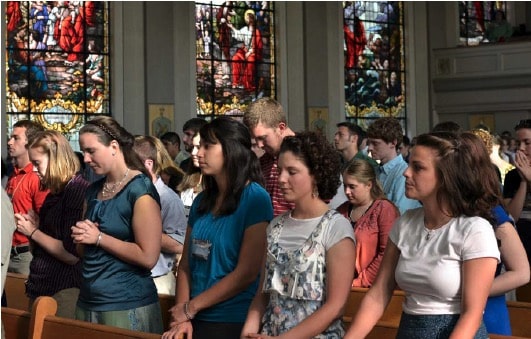
“People are looking for truth,” Botelho said. “They’re looking for something that’s not going to disappoint them, that’s not going to let them down.” They want something like a promise that everything is going to turn out OK, she said. “They want truth.”
In fact, Botelho estimated that she hasn’t encountered any true atheists on campus. Most people are just more agnostic than they are atheist, she said. In terms of reaching people in this category, again, many of those ministering on campus share similar approaches.
Botelho spoke about “providing a space to ask questions that don’t even have to be deep.”
Lemoine, the Atlantic Regional Manager for CCO, echoes the need to meet students “where they’re at.”
On a practical level, this may mean that CCO missionaries will ask students their thoughts on general things such as the meaning of life.
Lemoine recalled going through the basic Gospel message with a student and getting to the point where Jesus died for our sins. Lemoine recounted how the student reacted with shock and exclaimed, “‘What? He died? And then what happened?'”
“She had never heard it,” Lemoine said. “I was so surprised.”
She noted how the receptivity of someone with no faith background can have quite an impact on fellow students, whether they are practicing or nominally Catholic. “It really helps their relationship with God and their trust,” Lemoine said.
Consistent human questions
Through her position with CCO, Lemoine has a pulse on the situation across Canadian campuses in all regions of the country.
The one thing that is consistent is that young people are really searching, Lemoine said. There’s the same longing, she said. “There’s definitely an openness.”
Lemoine explains that she began working with CCO as a missionary in 2006 when she was in her early 20s. During the last 16 years, Lemoine has served with CCO for 13 of them.
At one point, she returned to work with the movement after two years away. Upon her return, Lemoine recalled being in her mid-30s and people advising her that things were different on campus now.
“It’s not going to be the same,” she recounted them saying.
Talking to the students, Lemoine realized that deep down they hadn’t changed. “They’re still looking for love,” she said.
Lemoine said that students are looking for affirmation, for friends, for someone to tell them they’re valuable. “It didn’t change.”
Klas, too, shared a similar experience.
The Catholic convert has been involved with Saint Paul’s Outreach since his freshman year. Combined with the seven years he spent working as a missionary, Klas has been with SPO for 11 years.
Harkening back to his first days on campus, Klas recognized much change in the conversations that take place as well as the “cultural and political climate” around the university. And yet, in one-on-one meetings with students, he maintained there are the same perennial human questions and concerns.
“Who am I? What am I made for? Where am I going? What’s the purpose of all this? Am I good? Am I really lovable?,” cites Klas. “Is there something more than this?”
“I would say that all those questions are still there for the most part,” he said. “It’s the same hearts and the same wounds and the same hurt and the same sin.”
It’s the same Lord, and humans are the same, Klas said. “The context is different, sometimes, but the Gospel is the same.”
Pleasant surprises
Between them, Lemoine and Klas have more than two decades of missionary experience on campuses. Some of their observations challenge preconceived notions about college students.

Klas noted that, perhaps contrary to what someone might expect on post-secondary campuses, he has not encountered his evangelistic efforts normally needing to exercise a type of apologetic stance when talking to people.
He maintains that students still tend to be quite open to dialogue about contentious issues and aren’t merely coming from some sort of political perspective or stance on a hot topic. In fact, he’s found people generally respectful and interested in his uniquely Catholic perspective.
For a lot of them, it’s such a unique thing that somebody would believe something contrary to the major thrust of society, he said.
When a Catholic perspective is shared, Klas has found that students don’t find it offensive and assume that he’s a terrible person. Instead, their response is often, “tell me more about that.”
They are interested in your thoughts, he said.
Lemoine, too, has had an overall positive experience when standing beside the Catholic banner at a CCO table on campus.
“I can’t think of an example where students responded rudely or negatively,” she said.
Obstacles
“As far as faith openness, I think what it is, is we all have this ache for love, and some of us are more aware than others,” Albrecht said. “I think in the depth of all of it is, we all have that craving for love.”
However, through her missionary experience, Albrecht has witnessed that multiple factors — such as geographic location and its corresponding pace of life — can affect a student’s openness to faith and their ability to respond to an invitation.
“The students weren’t always able to receive an invitation. But they craved it,” Albrecht said of her time at a fast-paced campus in Los Angeles. “So the moment one of them would say ‘yes’ to a Bible study, or would say ‘yes’ to coming to pray in adoration, it would spark this little fire in them. And then they would go tell their friends about it. Because something beautiful had happened.”
Besides pace of life, Klas cited another variable in campus culture that can be an impediment. He mentioned the prevalent use of dating apps, which seems to result in a constant preoccupation with dating. Klas suggested that this tends to numb people to some of the important existential questions.
“They’re not thinking about those questions because they’re numbing themselves with something that’s going to distract them,” he said.
As a result, Klas noted that it can potentially take more investment in walking with young people to begin to ask questions such as: What is your life really about? Who do you want to be? What’s important to you?
It can take a little while to wake people up, he said.
Turning obstacles into opportunities
Botelho, too, referenced the role of distraction.
She addressed how her peers have been called the “scrolling generation,” wherein they sit and scroll through their phones because of its addictiveness.
But, Botelho said, they are searching for something to catch their attention and provide meaning, whether they know it or not.
“In conversation when you ask people, generally people tend to be desiring something, but they don’t always know how to ask for it, or they don’t even know what they want,” she said.
Botelho suggested that those in ministry can use this as an opportunity to present what is truly desired and will fill this void. “[The word] ‘malaise’ gets thrown around a lot” in this regard, she said, “but it’s pretty accurate.” She explained that people sense and recognize that something is not right and say, “I am desiring something, but I don’t really know how to get there. And I don’t know what it is.”
Having missionaries and evangelists on campus helps college students explore the answers to these life-altering questions.
Klas, too, perceives an interesting dynamic in society that presents another occasion to share the Faith.
He explained that while there are political, social and cultural shifts happening that are drawing people away from a Christian worldview, they simultaneously are experiencing great dissatisfaction. Klas said that there is immense division and tensions among people as well as varying perspectives and questions about what really matters.
Klas, 28, sees this as an opportunity to propose questions about whether this is the best we can do or if there is something more going on. “That’s an open door, I think,” Klas said.
Hope for students
Klas proposed that it’s easy to think that we are losing ground or even on the defensive. But he noted that, from a scriptural standpoint, heaven is invading Earth, and the Lord is not resting on his laurels. The Lord is moving forward and bringing people to himself, Klas said.
“God is still God,” he said.
God’s heart for the people on his campuses is just as passionate, and he desires for them to know him in the same way that he always has, Klas said.
“It’s not a lost generation,” Lemoine said. “There’s a lot of hope.”
Lemoine stressed that the Holy Spirit is at work, and people’s prayers are making a difference. “Young people need to hear this, want to hear this [and] are responding,” Lemoine said.
Botelho shared a similar perspective. She addressed the concept of “success” in campus ministry and affirmed that it’s important not to get caught up in numbers regarding Mass attendance and event participation.
“People are looking for this,” Botelho said. “That’s what we’re trying to do: support the seeker into finding what they’re seeking. And that’s God, ultimately.”
While Botelho acknowledged that there is talk of a “spiritual crisis,” she is also adamant that “there are people trying to combat that. And we are having success. So, it’s not all doom and gloom for ministry.”
“God hasn’t abandoned ministry,” Botelho said. God is present and providing the grace people need to reach others. “We just have to be open to the graces that he’s giving.”
Nicole Snook writes from Canada.


